Zonie63
Posts: 2826
Joined: 4/25/2011
From: The Old Pueblo
Status: offline

|
quote:
ORIGINAL: Real0ne
quote:
The topic of the thread was Holocaust Denial, as I understood it.
Well really cannot talk intelligently about it until we establish which definition is appropriate now can we. I have asked how many times for you and others to discuss and choose the definition first but nope everyone simply avoids it and ful speed ahead into darkness! LOL
Okay, fair enough. Definitions:
Holocaust
quote:
hol·o·caust (hl-kôst, hl-)
n.
1. Great destruction resulting in the extensive loss of life, especially by fire.
2.
a. Holocaust The genocide of European Jews and others by the Nazis during World War II: "Israel emerged from the Holocaust and is defined in relation to that catastrophe" (Emanuel Litvinoff).
b. A massive slaughter: "an important document in the so-far sketchy annals of the Cambodian holocaust" (Rod Nordland).
3. A sacrificial offering that is consumed entirely by flames.
[Middle English, burnt offering, from Old French holocauste, from Latin holocaustum, from Greek holokauston, from neuter of holokaustos, burnt whole : holo-, holo- + kaustos, burnt (from kaiein, to burn).]
holo·caustal, holo·caustic adj.
Usage Note: Holocaust has a secure place in the language when it refers to the massive destruction of humans by other humans. Ninety-nine percent of the Usage Panel accepts the use of holocaust in the phrase nuclear holocaust. Sixty percent of the Panel accepts the sentence As many as two million people may have died in the holocaust that followed the Khmer Rouge takeover in Cambodia. But because of its associations with genocide, people may object to extended applications of holocaust. When the word is used to refer to death brought about by natural causes, the percentage of the Panel accepting drops sharply. Only 31 percent of the Panel approves the sentence In East Africa five years of drought have brought about a holocaust in which millions have died. In a 1987 survey, just 11 percent approved the use of holocaust to summarize the effects of the AIDS epidemic. This suggests that other figurative usages such as the huge losses in the Savings and Loan holocaust may be viewed as overblown or in poor taste. · When capitalized Holocaust refers specifically to the destruction of Jews and other Europeans by the Nazis and may also encompass the Nazi persecution of Jews that preceded the outbreak of the war.
Word History: Totality of destruction has been central to the meaning of holocaust since it first appeared in Middle English in the 14th century, used in reference to the biblical sacrifice in which a male animal was wholly burnt on the altar in worship of God. Holocaust comes from Greek holokauston ("that which is completely burnt"), which was a translation of Hebrew 'lâ (literally "that which goes up," that is, in smoke). In this sense of "burnt sacrifice," holocaust is still used in some versions of the Bible. In the 17th century the meaning of holocaust broadened to "something totally consumed by fire," and the word eventually was applied to fires of extreme destructiveness. In the 20th century holocaust has taken on a variety of figurative meanings, summarizing the effects of war, rioting, storms, epidemic diseases, and even economic failures. Most of these usages arose after World War II, but it is unclear whether they permitted or resulted from the use of holocaust in reference to the mass murder of European Jews and others by the Nazis. This application of the word occurred as early as 1942, but the phrase the Holocaust did not become established until the late 1950s. Here it parallels and may have been influenced by another Hebrew word, ô'â ("catastrophe," in English, Shoah). In the Bible ô'â has a range of meanings including "personal ruin or devastation" and "a wasteland or desert." ô'â was first used to refer to the Nazi slaughter of Jews in 1939, but the phrase ha-ô'â ("the catastrophe") became established only after World War II. Holocaust has also been used to translate urbn ("destruction"), another Hebrew word used to summarize the genocide of Jews by the Nazis.
Denial
quote:
de·ni·al (d-nl)
n.
1. A refusal to comply with or satisfy a request.
2.
a. A refusal to grant the truth of a statement or allegation; a contradiction.
b. Law The opposing by a defendant of an allegation of the plaintiff.
3.
a. A refusal to accept or believe something, such as a doctrine or belief.
b. Psychology An unconscious defense mechanism characterized by refusal to acknowledge painful realities, thoughts, or feelings.
4. The act of disowning or disavowing; repudiation.
5. Abstinence; self-denial.
Holocaust Denial
quote:
Holocaust denial is the act of denying the genocide of Jews in the Holocaust during World War II.[1] The key claims of Holocaust denial are: the German Nazi government had no official policy or intention of exterminating Jews, Nazi authorities did not use extermination camps and gas chambers to mass murder Jews, and the actual number of Jews killed was significantly (typically an order of magnitude) lower than the historically accepted figure of 5 to 6 million.[2][3][4]
Holocaust deniers generally do not accept the term denial as an appropriate description of their activities, and use the term revisionism instead.[5] Scholars use the term "denial" to differentiate Holocaust deniers from historical revisionists, who use established historical methodologies.[6] The methodologies of Holocaust deniers are criticized as based on a predetermined conclusion that ignores extensive historical evidence to the contrary.[7]
Most Holocaust denial claims imply, or openly state, that the Holocaust is a hoax arising out of a deliberate Jewish conspiracy to advance the interest of Jews at the expense of other peoples.[8] For this reason, Holocaust denial is generally considered to be an antisemitic[9] conspiracy theory.[10]
Terminology and etymology
Holocaust deniers prefer to refer to their work as historical revisionism, and object to being referred to as "deniers".[5] Scholars consider this to be misleading, since the methods of Holocaust denial differ from those of legitimate historical revision.[6] Legitimate historical revisionism is explained in a resolution adopted by the Duke University History Department, November 8, 1991, and reprinted in Duke Chronicle, November 13, 1991 in response to an advertisement produced by Bradley R Smith's Committee for Open Debate on the Holocaust:
That historians are constantly engaged in historical revision is certainly correct; however, what historians do is very different from this advertisement. Historical revision of major events ... is not concerned with the actuality of these events; rather, it concerns their historical interpretation – their causes and consequences generally.[11]
In The Holocaust: Problems and Perspectives of Interpretation, Donald L. Niewyk gives some examples of how legitimate historical revisionism—the re-examination of accepted history and its updating with newly discovered, more accurate, or less-biased information—may be applied to the study of the Holocaust as new facts emerge to change the historical understanding of it:
With the main features of the Holocaust clearly visible to all but the willfully blind, historians have turned their attention to aspects of the story for which the evidence is incomplete or ambiguous. These are not minor matters by any means, but turn on such issues as Hitler's role in the event, Jewish responses to persecution, and reactions by onlookers both inside and outside Nazi-controlled Europe.[12]
In contrast, the Holocaust denial movement bases its approach on the predetermined idea that the Holocaust, as understood by mainstream historiography, did not occur.[7] Sometimes referred to as "negationism", from the French term négationnisme introduced by Henry Rousso,[13] Holocaust deniers attempt to rewrite history by minimizing, denying or simply ignoring essential facts. Koenraad Elst writes:
Negationism means the denial of historical crimes against humanity. It is not a reinterpretation of known facts, but the denial of known facts. The term negationism has gained currency as the name of a movement to deny a specific crime against humanity, the Nazi genocide on the Jews in 1941–45, also known as the holocaust (Greek: complete burning) or the Shoah (Hebrew: disaster). Negationism is mostly identified with the effort at re-writing history in such a way that the fact of the Holocaust is omitted.[14]
I think that this part covers most of the salient points about definitions and word usage when it comes to this topic. You object to being called a "denier," which is also covered in the article quoted above.
quote:
quote:
That's what I was commenting on. Whether they're called "Holocaust Deniers" or whatever else you want to call them is beside the point ("revisionists" perhaps?), even if they accept some facts while denying others.
well anything I do not accept is NOT a fact. If it were a FACT I would accept it.
Well, what facts can we agree on?
quote:
quote:
I'm not going to quibble over the term, as I'm not that concerned with wordsmithing.
Oh but anyone who wants to discuss anything with me had better ba able to make those distinctions or I will not waste my time.
I will keep this in mind for future reference.
quote:
quote:
The question in this thread, though, was whether [whatever you want to call it] was antisemitic. Without necessarily answering that question directly, I was wondering if there could be other possible motives behind it.
I already posted my response to antisemetic in a response to domken on the last page. the whole notion is foolishness.
Maybe it is, maybe it isn't. To some degree, I would agree that motive is irrelevant anyway, at least when verifying the facts of history. If someone makes a claim (or a denial of claims made by others), then the only thing to do is look at the factual basis of that claim (or denial) and not ascribe some sort of ulterior motive to it. "Just the facts."
If someone says "2+2=5," then it makes no real difference why they say it, as long as someone is there to set the record straight.
But then again, it's still a fair question to ask just the same. It's not a historical question as much as it's a question of what's going on today and examining the motives and intentions of people who hold this particular view. While the question may not have any bearing on the actual historical facts of World War II and the Holocaust, it might still have value from the point of view of today's politics and the different political movements in the modern world.
quote:
quote:
I don't think I claimed to be neutral and unbiased, but regardless, if I'm presented with a set of facts which can be verified and checked by numerous sources, then I'm stuck with those facts no matter what my personal feelings might be.
Everything I have talked about can be checked out. All that entertainment that you continue to gloss over. If you cannot prove it out you have not bothered to look and certainly have not researched it simple as that.
I have checked it out, but what you're talking about are very tiny pictures within the scope of a very huge picture. You're looking at possible flaws in individual trees without taking a look at the entire forest.
quote:
quote:
You say that a fraud has been perpetrated, and let's assume for a moment that you're correct. What, exactly, is the "fraud" here?
the information disseminated or withheld from the public.
How do you know if information is being withheld if we're not told about it? In some cases, it may not mean there's any deliberate cover up. Sometimes, information is missing. Pieces of evidence may be missing. Data incomplete. But even despite that, we might still have enough data to form a reasonable conclusion.
quote:
quote:
Looking at it from the big picture, let's take a look at Nazi Germany as a whole and what they actually did throughout Europe. How did they treat their own people? What were their racial policies? What did Hitler say to the Reichstag on January 30, 1939?
quote:
If the international finance-Jewry inside and outside Europe should succeed in plunging the nations into a world war yet again, then the outcome will not be the victory of Jewry, but rather the annihilation of the Jewish race in Europe!
No lets not, we dont even have a working definition for holocaust yet.
Okay, well, I took care of that above. If you don't like those definitions, then please provide your own definitions and we'll go from there.
To try to put it into the framework of the topic in this thread, the question revolves around the possible motivations behind this particular school of thought - whatever you may wish to call it. Again, I'm not going to quibble over this or get caught up in a game of wordsmithing. For all I care, you can call it "Spaghetti Sauce" and define it any which way you wish. For Pete's sake, call it something so we can get past this point.
If you're also quibbling over the term "antisemitic," then okay. Let's set that aside, too.
The question still remains why people might hold this particular view which seeks to cast doubt on certain events which occurred during the Second World War.
quote:
quote:
Hitler and his cohorts were clearly obsessed with the Jews, passing the Nuremberg Laws, engineering Kristallnacht, deporting Jews, occupying other nations and rounding them up, putting them in camps, sending out Einsatzgruppen to engage in mass murder. That's already quite a bit on their record.
Not there yet. Still have not settled the entertainment matters.
Is that the point we're stuck on? Entertainment? Is this related to the question of a swimming pool at Auschwitz?
I wouldn't doubt that there may have been a swimming pool there. It was a huge complex with factories and barracks for as many as 200,000 people at a time. Finding a swimming pool in there doesn't seem all that far fetched to me, but how is it relevant to what's being discussed here?
The Germans also did the same thing in Theresienstadt, where they fixed everything up to make it look like an idyllic town where everyone was happy and singing and just having a wonderful time - mainly for the sake of Red Cross inspectors who were finally allowed to visit the place. They also made a propaganda film about it. The film was made by a Dutch Jewish filmmaker named Kurt Gerron, who was sent to Auschwitz afterwards. The film disappeared after the war, but a portion of it was found some years later.
Here's some entertainment. Is that the kind of entertainment you were referring to?
< Message edited by Zonie63 -- 1/26/2013 6:27:57 AM >
|

 Profile
Profile




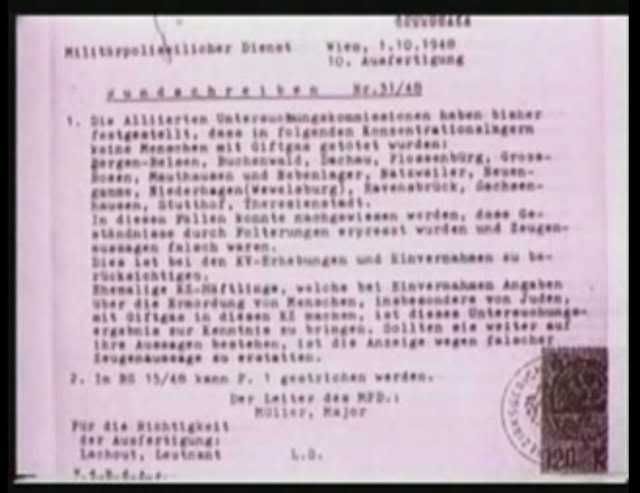

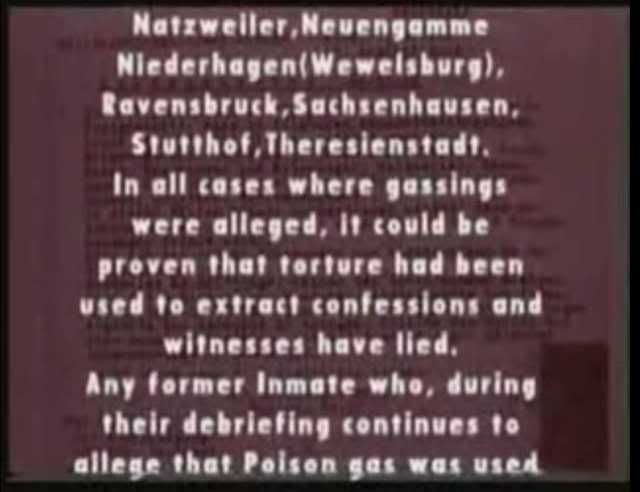

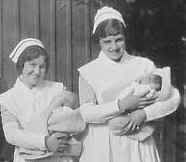
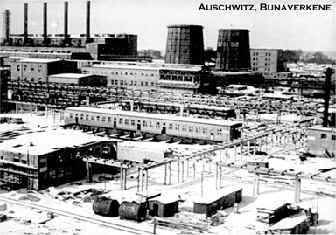
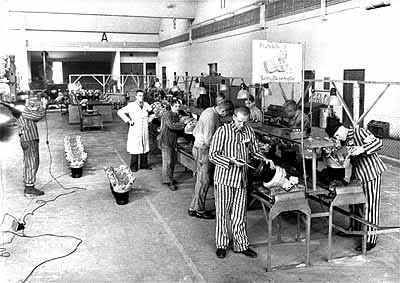
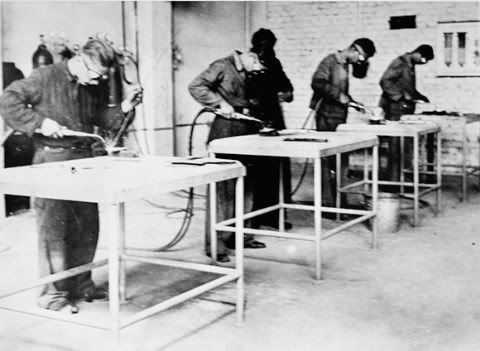
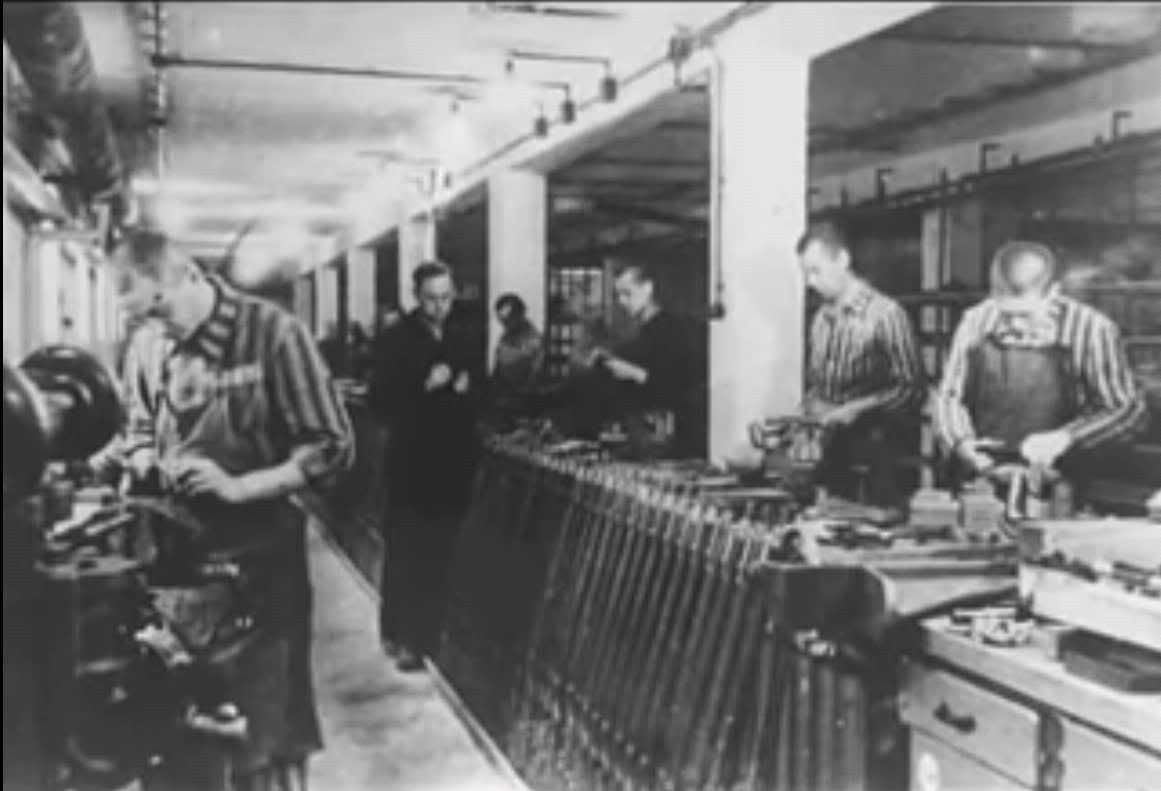



 New Messages
New Messages No New Messages
No New Messages Hot Topic w/ New Messages
Hot Topic w/ New Messages Hot Topic w/o New Messages
Hot Topic w/o New Messages Locked w/ New Messages
Locked w/ New Messages Locked w/o New Messages
Locked w/o New Messages Post New Thread
Post New Thread